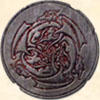Port Ghaast
Although a major town of Hallstatt, Port Ghaast is better described as a military encampment. One of the current kings of Hallstatt, the nearly senile Tharmakkas IV, is obsessed with the defeats Hallstatt suffered in the First and Second Great Reclamations—attempts by Hallstatt to conquer Semphar in a return to the glory of the Celtic Empire. His obsession is such that he ignores the proper governance of his lands in favor of fortifying his frontier and paying vast sums to mercenaries of questionable worth. Port Ghaast, with its forts and barracks, is the jewel of his military empire.
Originally, the port was a small town for the trans-shipment of lumber from the Shalhoond. Logs floated downstream were loaded on ships in the small harbor. When the king first attempted to invade Semphar, he choose Port Ghaast as his staging point. The wooden stockade was replaced by proper stone fortifications. New barracks were built for the army. Camp followers first built a shanty town and then expanded into a proper settlement. Now, Port Ghaast is a major military base of the Hallstatt army.
Fortunately for Semphar, the Hallstatt army (mostly impressed peasants and mercenaries) isn’t very motivated or well-disciplined. Tharmakkas is much more adept at spending his kingdom’s treasury than at using it wisely. As a result, Port Ghaast is a rough and brawling town, just the type of place one would expect with 5,000 well-paid and idle mercenaries cooling their heels. Although Port Ghaast has a Celtic majority the mercenaries openly flout Druidic laws. Drinking, gambling, and wenching are common activities. There is little the citizens can hope to do against the mercenaries. Although the regular army enforces the peace, the mercenaries enjoy the special protection of the king.
The citizens hate the mercenaries. They dislike the army, which they think is protecting the hired soldiers. The army views the mercenaries with contempt, as hired swords only good as cannon fodder. The mercenaries dislike both groups— the citizens are bleating sheep and leeches; the Hallstatt army, a lot of pompous and unprofessional fools. The mercenaries are a cynical bunch, who have few illusions about their own honor but who take great pride in their professionalism.
The town is more or less divided into three districts. The mercenaries live in often squalid barracks outside the main walls. Their barracks are scattered far apart, a lesson learned after the Sell-Sword Rebellion 20 years ago. Dividing the barracks are fortified watchtowers of the regular army. Near the city walls are the businesses that cater to the tastes of the hired swords—the taverns, gambling dens, and brothels. The regular army has its barracks in the main keep of the town and in the fortified outposts along the wails. These are built to protect against rebellion as much as outside attack. The armories are extremely well-guarded.
The citizens live both inside and outside the walls. The wealthiest live inside, isolated from the rough-and-tumble world beyond the walls. The poor and everyday workers live on the fringes of town, beyond even the mercenary barracks.
Because it has such a high concentration of rough and tumble fighting men (3,000 to 5,000 mercenaries, depending on the season; 4,000 regular army), there is always plenty of action and work in Port Ghaast. The city guard (a thankless job) always needs warriors and wizards. Many temples have been built to accommodate the wide variety of faiths among the men.
There are thieves and bards aplenty, even though justice is normally dispensed with a sword. It’s a risky life for any person, but one that many would never do without.
The current commander of the regular garrison and military governor of the town is Umar the Patrician. He is an intelligent man and good commander, but is frustrated by the lack of discipline or activity for his troops. He knows perfectly well that Tharmakkas is a fool, wasting money on worthless, dishonorable mercenaries. Still, he struggles to do his best. He has been approached several times by disaffected noblemen, but for now has not considered their treasonous words.
But, he has not reported them, either.
